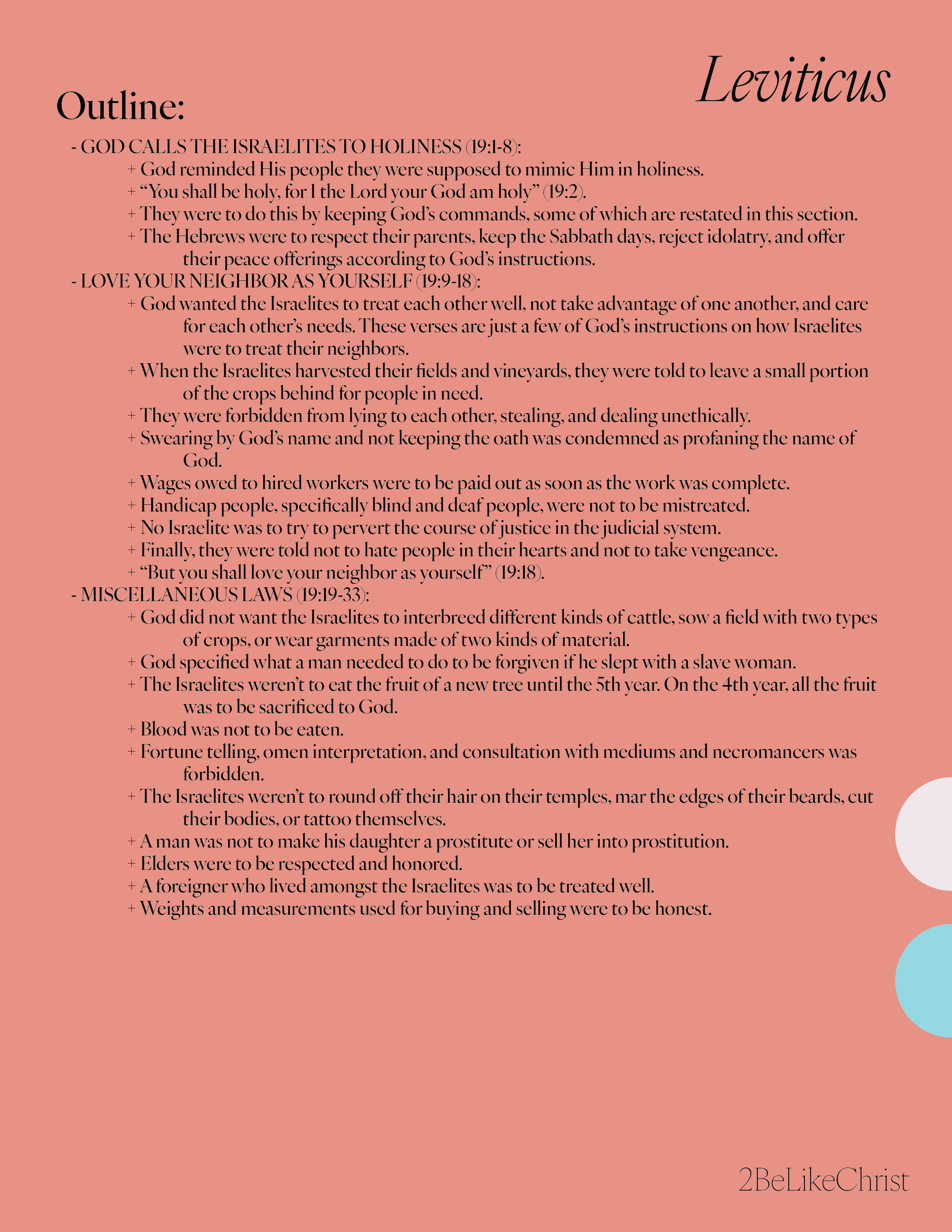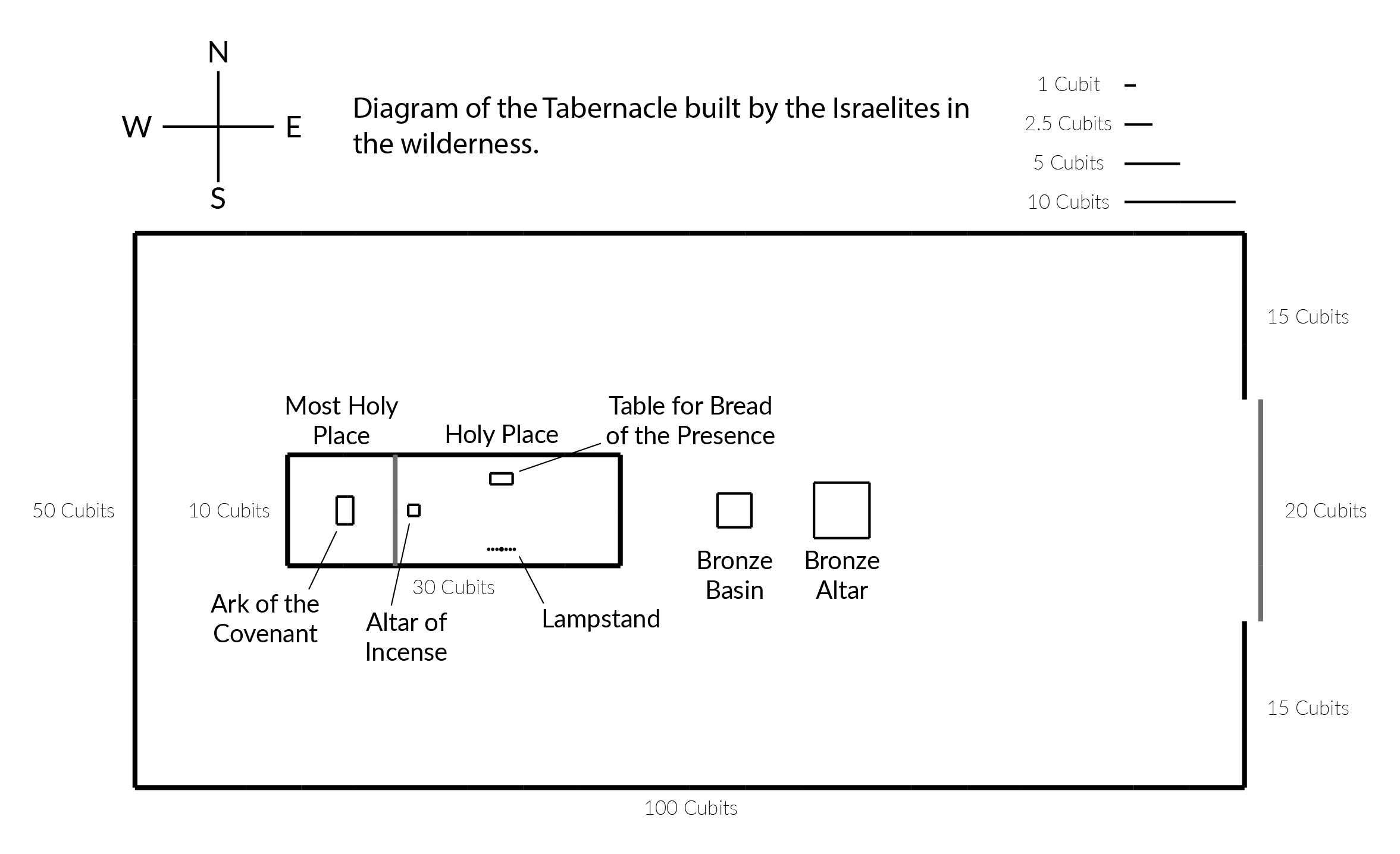Leviticus 19 Summary: A Short Breakdown in 5 Minutes
Leviticus 19 Summary - A Quick Overview
WHEN:
Leviticus picks up where Exodus left off. The children of Israel are on their way through the wilderness to the Canaan land.
According to Leviticus 8, the Tabernacle had already been erected, which would place the year at approximately 1490 B.C. (one year after the Israelites left Egypt).
DEFINITIONS:
Stranger – The Bible uses the word “stranger” to describe foreigners (people who weren’t descendants of the 12 sons of Jacob) who lived amongst the Israelites, both in the wilderness and in Canaan.
Necromancer – Someone who uses magic to conjure the spirits of the dead.
TABERNACLE DIAGRAM
OUTLINE:
GOD CALLS THE ISRAELITES TO HOLINESS (19:1-8):
God reminded His people they were supposed to mimic Him in holiness.
“You shall be holy, for I the Lord your God am holy” (19:2).
They were to do this by keeping God’s commands, some of which are restated in this section.
The Hebrews were to respect their parents, keep the Sabbath days, reject idolatry, and offer their peace offerings according to God’s instructions.
LOVE YOUR NEIGHBOR AS YOURSELF (19:9-18):
God wanted the Israelites to treat each other well, not take advantage of one another, and care for each other’s needs. These verses are just a few of God’s instructions on how Israelites were to treat their neighbors.
When the Israelites harvested their fields and vineyards, they were told to leave a small portion of the crops behind for people in need.
They were forbidden from lying to each other, stealing, and dealing unethically.
Swearing by God’s name and not keeping the oath was condemned as profaning the name of God.
Wages owed to hired workers were to be paid out as soon as the work was complete.
Handicap people, specifically blind and deaf people, were not to be mistreated.
No Israelite was to try to pervert the course of justice in the judicial system.
Finally, they were told not to hate people in their hearts and not to take vengeance.
“But you shall love your neighbor as yourself” (19:18).
MISCELLANEOUS LAWS (19:19-33):
God did not want the Israelites to interbreed different kinds of cattle, sow a field with two types of crops, or wear garments made of two kinds of material.
God specified what a man needed to do to be forgiven if he slept with a slave woman.
The Israelites weren’t to eat the fruit of a new tree until the 5th year. On the 4th year, all the fruit was to be sacrificed to God.
Blood was not to be eaten.
Fortune telling, omen interpretation, and consultation with mediums and necromancers was forbidden.
The Israelites weren’t to round off their hair on their temples, mar the edges of their beards, cut their bodies, or tattoo themselves.
A man was not to make his daughter a prostitute or sell her into prostitution.
Elders were to be respected and honored.
A foreigner who lived amongst the Israelites was to be treated well.
Weights and measurements used for buying and selling were to be honest.
APPLICATION:
Many people look at chapters like this and think, “God just likes to put restrictions on people and force them to comply.”
But I would argue that is not the case. God restricted the Israelites and restricts His disciples today because restrictions are essential to identity, and God has always wanted His people to have a unique identity separate from the rest of the world.
You cannot have an identity without restrictions on behavior.
If you approve of and affirm every behavior and every way of life, you will be an amorphous blob that stands for nothing.
In the case of the Israelites, God wanted them to strive for holiness and godliness. Being “godly” means having an identity based on God’s nature.
In our case, we strive for godliness and Christlikeness.
Without the restrictions that guide us away from ungodly and unholy behavior, we wouldn’t know how to live, we would have no identity.
Is it any surprise that so much of our world is struggling with an identity crisis that’s leading people into depression, into hopelessness, and into vain attempts to try to discover identity apart from the Creator.


